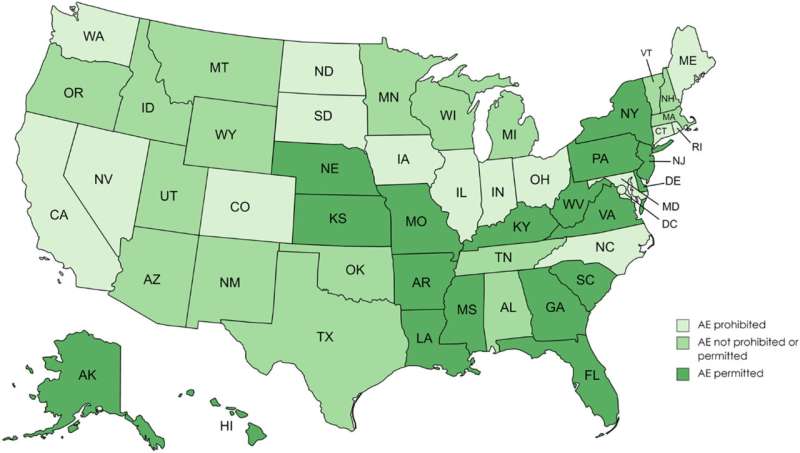This article has been reviewed according to Science X's editorial process and policies. Editors have highlighted the following attributes while ensuring the content's credibility:
fact-checked
trusted source
proofread
States maintain outdated laws that create barriers to screening and treatment for alcohol use disorder, finds analysis

Eighteen U.S. states have laws that allow insurance companies to deny health care payments to treat people who were intoxicated when they sustained an injury, despite evidence showing that these laws prevent people from receiving treatment for alcohol use disorder and shift costs from insurance companies to the health care system, the government, individuals and families.
Since 2004, the number of states maintaining these laws has dropped by half, and the number of states specifically prohibiting these insurance exclusions has increased five-fold to fifteen, according to a legal analysis of the status of alcohol exclusion laws by state recently published in Alcohol: Clinical and Experimental Research.
Fifteen U.S. states and the District of Columbia have banned alcohol exclusions. California, Colorado, Connecticut, District of Columbia, Illinois, Indiana, Iowa, Maine, Maryland, Nevada, North Carolina, North Dakota, Ohio, Rhode Island, South Dakota, and Washington all passed laws between 1998 and 2009 to prohibit insurance companies from denying payments for injuries sustained while a covered individual was intoxicated.
The eighteen states that continue to have laws permitting alcohol exclusion, which have been on the books since as early as the 1950s, include Alaska, Arkansas, Delaware, Florida, Georgia, Hawaii, Kansas, Kentucky, Louisiana, Mississippi, Missouri, Nebraska, New Jersey, New York, Pennsylvania, South Carolina, Virginia, and West Virginia.
Seventeen states have no laws allowing or prohibiting alcohol exclusion: Montana and Oregon repealed their alcohol exclusion laws in 2019, and Tennessee, Texas, and Vermont repealed their alcohol exclusion laws in 2015, 2005, and 2002, respectively. Massachusetts, Michigan, New Hampshire, New Mexico, Utah, and Wisconsin have no alcohol exclusion laws. Alabama, Arizona, Idaho, and Wyoming have alcohol exclusion laws for disability insurance only, and Minnesota and Oklahoma have exclusions for narcotics only, not alcohol.
Alcohol Exclusion Laws were originally proposed by the National Association of Insurance Commissioners (NAIC) more than 70 years ago and adopted by 40 states and the District of Columbia. However, in 2001, the NAIC recommended repealing these laws, recognizing that they financially disincentivized physicians and hospitals from screening and treating trauma patients for substance use problems and prevented them from getting effective treatment.
Alcohol use disorder is a complex illness involving genetic, social, and environmental factors. Only six percent of the more than 14 million adults and four hundred thousand adolescents receive treatment.
The authors of the analysis suggest that dismantling state alcohol exclusion laws may reduce barriers to treatment for alcohol use disorder, prevent future accidents, and decrease overall health care costs.
More information: Sunday Azagba et al, Health claims denial for alcohol intoxication: State laws and structural stigma, Alcohol: Clinical and Experimental Research (2023). DOI: 10.1111/acer.15153. onlinelibrary.wiley.com/doi/10.1111/acer.15153





















